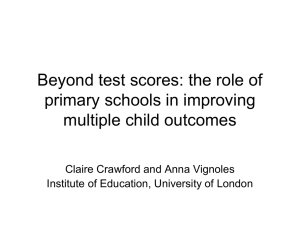Trends in research on intensive family preservation programs
advertisement
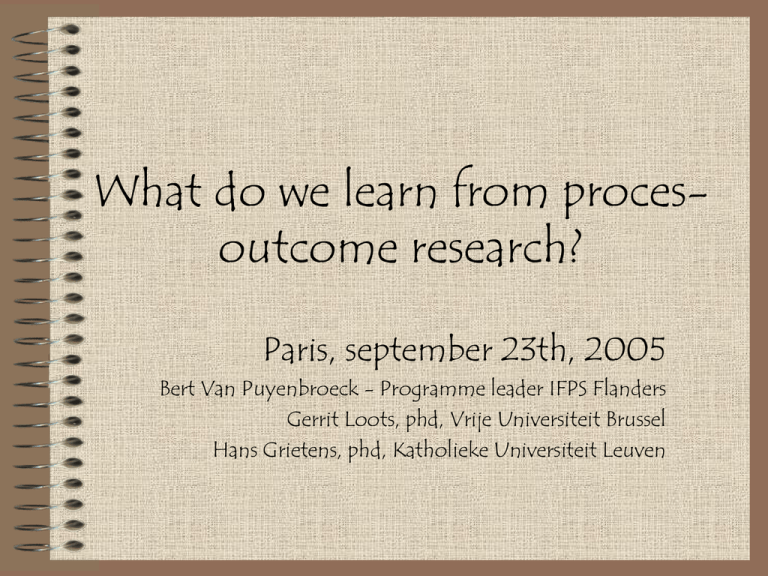
What do we learn from procesoutcome research? Paris, september 23th, 2005 Bert Van Puyenbroeck - Programme leader IFPS Flanders Gerrit Loots, phd, Vrije Universiteit Brussel Hans Grietens, phd, Katholieke Universiteit Leuven IFPS-program • Intensive Family Preservation: Crisishulp aan Huis • Crisis = minor is about to be placed out of home (residential care; foster care; ..) • At home service • Short term programme, during 4 to 6 weeks • Family can reach IFPS team or family worker 24h/day, 7d/ week ; family worker can also reach supervisor at any time • Intensive: 8h/week, 10 meetings/ week at home • To prevent unnecessary out of home placement IFPS in Europe & USA • IFPS programs in USA (Seattle) (Homebuilding) • Netherlands (Families First) • U.K. • Germany ( FAM; FIM) • Luxemburg • Finland • Flanders (Crisishulp aan Huis) Research items former research 1. What’s the target group reached by IFPS? 2. What are the results of an IFPS program? = outcome based research, focused only on an ‘out of home placement index’ Basic results international literature • It seems that: – Comparable results of these ‘homebuilding based IFPS programs’ in the Netherlands, Flanders, Seattle = in different cultures? • ‘succesratio’ of 73% up to 91% Critical thinking about these research items • How does that come? • What is ‘result’: outcome based, quantitative research: index of out of home placement? • OHP isn’t necessary negative (safety issue) Questions • What are the procesess behind these results? • What difference can an IFPS program make for the family? • What is our basic objective? Proces-outcome research: what’s the impact of an IFPS program • The research program is based on – an integration of quantitative and qualitative research methods to relate: • outcome data to the intervention processes and the experiences of the family members. – Quantitative research data • What are the outcomes of an IFPS in Flanders? – Qualitative research • What are the processes behind these outcomes? • What are the changes we are able to introduce in the family system? Major question • « does a family has any perspective on how to go on as a family, how to raise the children, how to stay together in this family, how to keep up? » • During the intervention, and afterwards? Perspective of the parent • focuses on the impact of Families First Flanders on parents’ experiences of parental stress, their relationship and interaction with their child/children, and their impressions of the strengths and difficulties of the minor. – Can I bear the stress? Are there a lot of stressfactors? – How is my relationship with my child? – Where can I find social support? Perspective of the minor the minors’ experiences of the parent-child interaction and their impressions of their own strengths and difficulties. – Do I feel myself competent as minor in this family, at school? – How is my relationship with my mother, my father? Focus of IFPS Flanders • If we want to make any difference, than: – Competence: what do I have in my pocket to keep up = competence-based model – Stress: how stressful is this situation for me? – Educational relation: how’s the relation with my child/ my parents – Social isolation/ support: can I relay on a supportive system/context? Research design • Within subjects / pretest-posttest-follow up design: • All families involved in a crisis intervention service (IFPS): – Minor – Parent (mother/ father) • Three moments – Beginning of the crisisintervention – At the end – One month after ending Instruments Competence Strenghts and Difficulties Questionnaire (SDQ) Stress Nijmeegse Vragenlijst Opvoedingssituatie (NVOS) Educational Relationship Ouder-Kind Interactievragenlijst (OKIV-R) Social Support Nijmeegse Ouderlijke Stressindex (NOSI) Procedure • Family workers – 2 Feedback & Training moments (before starting/ after 3 months) • Referal service – Standardised letter: short introduction to the research project • Family – Referal service: first introduction – Family worker: first questionnaires at the start & short acknowledgement from both researchers – at the end – after one month – Closed envelopes back to FW (+ send to university Brussels) Overview: questionnaires Informant Start End Follow up Parent SDQ OKIV-R NVOS NOSI SDQ OKIV-R NVOS NOSI SDQ OKIV-R NVOS NOSI Feedback Quest Minor SDQ OKIV-R mother OKIV-R father SDQ OKIV-R mother OKIV-R father SDQ OKIV-R mother OKIV-R father Feedback Quest This overview today • Quantitative data-analysis of the families involved in the programme during the first six months will be presented and discussed: – SDQ – NVOS – OKIV-R OKIV-R educational relationship (parent) 4 3, 5 3 2, 5 2 1, 5 1 0, 5 0 -0, 5 -1 -1, 5 -2 -2, 5 -3 -3, 5 -4 CaH CNM CNF Conf l i ct s A ccept at i on OK I V - R schal en T ot al OKIV-R educational relationship (parent) 4 3,5 3 2,5 2 1,5 1 0,5 0 -0,5 -1 -1,5 -2 -2,5 -3 -3,5 -4 Conf l i cts Acceptati on T otal T1 T2 T3 Conclusion OKIV-R parent • Parents experience their relationship with minor as very problematic • This does not change/ improve during or after the crisintervention OKIV-R educational relationship (minor) OK I V - R schal en 3 CaH 1 K NM -1 K NV -3 Conf l i ct hant er i ng A ccept at i e T ot aal OKIV-R educational relationship (minor) 2, 5 1, 5 0, 5 Conf l i ct hant er i ng A ccept at i e -0, 5 T ot aal -1, 5 -2, 5 -3, 5 T1 T2 T3 Conclusion OKIV-R minor • Minors experience their relationship with their parents as very problematic • This doesn’t change/ improve during or after the crisisintervention SDQ Strengths & Difficulties Minor (parent) T ot al di f f i cul t i es scor e 20 15 10 5 0 T1 T2 T3 SDQ Strengths & Difficulties Minor (parent) 8 E mot ion al 7 sympt oms 6 Con duct pr oblems 5 Hyper act ivti y 4 3 P eer pr oblems 2 P r osocial behaviour 1 0 T1 T2 T3 Conclusion SDQ parent • Total difficulties score is: problematic range • This changes significantly during & after crisisintervention (T3 – T1) • Most important changes – Emotional symptoms – Hyperactivity • And trend: – Conduct problems SDQ Strengths & Difficulties Minor (minor) T ot aldif f icult ies scor e 25 20 15 10 5 0 T1 T2 T3 SDQ Strengths & Difficulties Minor (minor) 8 Emot ion al 7 sympt oms 6 Con duct 5 pr oblems 4 Hyper act ivti y 3 2 Peer pr oblems 1 0 Pr osocial T1 T2 T3 behaviour Conclusions SDQ minor • Total difficulties score is: borderline range • This changes significantly during & after crisisintervention (T3 – T1) • Most important changes – Hyperactivity • Trend: – Conduct problems NVOS, part 1 Stress, Opvoedingsbelasting (parent) 3, 5 3 2, 5 2 r esi dent i al gr oup 1, 5 I FP S 1 0, 5 0 A cc A an Pr o A nd B el Al l Pl e Goe NVOS, part 1 Stress, Opvoedingsbelasting (parent) A ccept at i e 4 A ankunnen 3 P r obl emen A nder s wi l l en 2 B el ast i ng 1 A l l een 0 P l ezi er T1 T2 T3 Goede omgang Conclusions NVOS • IFPS families experience the situation as problematic as families where minor is placed in residential care (norm group) • This is: target group of IFPS (trying to prevent an unnecessary OHP) • This improves in some ‘domains’ of the educational situation – Significantly: « situation can’t go on like this » and « I’m standing alone » and « experiencing some fun » – Trend: « I can(not) handle the situation » NVOS, part 2 ID of situation (parent) 7 6 5 4 3 2 1 0 T1 T2 T3 NVOS, part 2 ID of situation (parent) 35 30 25 20 T1 15 T2 10 T3 5 0 B0 8 B0 7 B0 6 B0 5 B0 4 B0 3 B0 2 B0 1 Conclusions NVOS • ID of the situation changes from « I experience quiet a lot of problems » to « sometimes I (still) experience problems in education » First conclusions • IFPS reaches the target group: trying te prevent unnecessary out of home placement of a minor, given their is a serious risk of OHP (NVOS) • During the intervention and afterwards, parents and minor experience the situation as less perspectiveless/ problematic (SDQ) • Parents identify the educational situation als less ‘demanding’ (NVOS) First conclusions • But: – Still, IFPS does not make a difference in the problematic relationship between parent and child – Hypothesis: IFPS helps to deminish the ‘crisis’ in the situation, while their is still a need for further family therapy. – Hypothesis: since family has again more ‘hope’, perspective on how to go on as a family , they’re more willing te accept/ go to further helping services. Further research • Reporting 12 months (october ’04 – september ’05) • also: domains of – Social support – Their evaluation of the programme • Qualitative research, based on these first quantitative research results – Hypotheses? – What helps them to get out of the crisis? – What didn’t help them? EUSARF 2007 • Presentation on both quantitative and qualitative research programs hubert.vanpuyenbroeck@vub.ac.be Thank you. Please contact me for further discussion
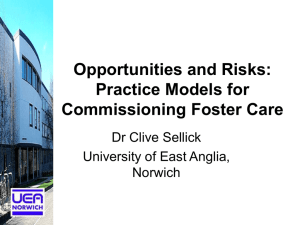
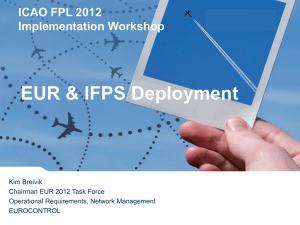
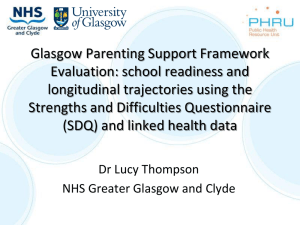
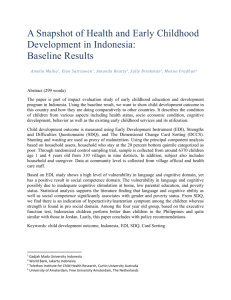
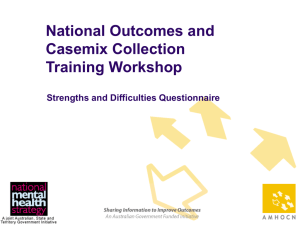
![[#PALLADIO-222] Automatically deriving the optimization problem](http://s3.studylib.net/store/data/007480371_1-e23cf3b38fdfe320514260fd192de951-300x300.png)
